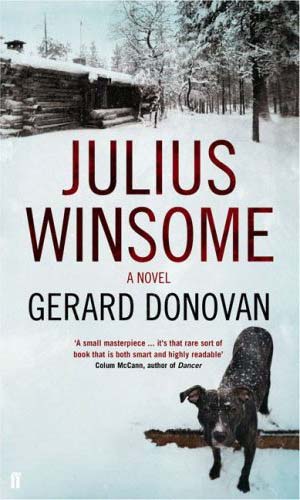 Julius Winsome has just been translated into Norwegian, and got the title Vinter i Maine. When it arrived at my bookshop I was immediately drawn in by the cover, and when we got a reading copy from the publisher, I knew I had to read it.
Julius Winsome has just been translated into Norwegian, and got the title Vinter i Maine. When it arrived at my bookshop I was immediately drawn in by the cover, and when we got a reading copy from the publisher, I knew I had to read it.The story evolves around Julius Winsome, a loner who lives in the middle of a desolate hunting area in Maine. The novel begins as his four-legged companion, Hobbes, is shot, and Julius has to bury his only friend. Julius is in many ways a strange man, but his grief is authentic and I as the reader really emphatised with him.
The setting of this novel really underlines the themes. The isolation of Julius' cottage and his isolation as a person go hand in hand. We learn that Julius' mother died giving birth to him, and that Julius lived with his father in this cottage until his father passed away. He has literally grown up walled in by books, as book shelves go from one wall to the next. Julius was brought up rehearsing Shakespearean words, and sometimes hearing tales of war from his father and grandfather. Ironically, the Winsome men are men of few words (although they're vocabulary is larger than most people's). This again creates a gap between Julius and other people. The world makes more sense to him when he can describe it with Shakespearean words. However, he points out that when he uses the Shakespearean words, he might as well be barking, because people don't understand him. At one point he has a girlfriend, but she abandons him just as suddenly as she showed up at his door.
The use of Shakespeare's words is also connected to the violence of the story. Shakespeare's works are full of violence and treachery, and since Julius knows little of other people apart from malevolence and betrayal, he finds comfort in hiding behind the shield of words. This works both literally, as his house is a stronghold of books, and his haven, as well as figuratively, in that he uses the words to perhaps feel distinct and above others.
A strong theme in this novel is nature, and how we live with it. For Julius, the forest is part of him, almost. He is safe in nature, he can read it and communicate with it. Julius knows a lot about hunting, camouflage, weapons, yet he seems to have a strong distaste for hunters. It is as if the animals of the forest somehow are kin to him, and the hunters are overstepping this bond. After his dog Hobbes is shot, Julius is determined to find who shot him, and balance things out. An eye for an eye, so to speak. It is clear that Julius' solitude, which has survived the loss of mother, father, lover, cannot survive the loss of Hobbes. Ironically, Hobbes is Julius' last symbolic connection to other people, as it was his ex girlfriend who suggested he get a dog. Once Hobbes is dead, that bond is severed, and Julius' isolation is complete. The reaction is a revenge plot.
This novel is truly beautifully written. Julius is authentic, and as a narrator he is quiet but telling. The story is tender, despite its violence. Julius bares his soul to us, showing us his hurt and solitude without asking for pity. Despite his isolation, he is a reflected man; he knows what he is doing. And his acts of violence are, if not justified, then at least reasonable to himself. I also find him quite kick-ass, and would love to see a movie where the revenge hero inflicts a deadly wound on someone, only to quote Shakespeare to them. In his quiet way, this novel is Julius' demand to be seen and recognised by the world. I for one came to care deeply for him... And I was truly sad when the novel ended.
Read it.





